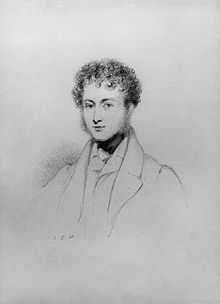Charles Stoddart
Charles Stoddart (born July 23, 1806 in Ipswich , † June 17, 1842 in Bukhara ) was a British diplomat .
Life
Stoddart was born on July 23, 1806 in Ipswich to Major Stephen Stoddart and Katherine Randal. His father died in a riding accident in 1812.
On March 15, 1823, he joined the Royal Staff Corps as a lieutenant . On February 9, 1826 he was promoted to first lieutenant. On February 7, 1834, he was placed on half pay as a captain . From 1833 to 1835 he served in the Royal United Service Institution and the Institution of Civil Engineers . He then went to Persia in 1835 as Military Secretary of the British envoy, Henry Ellis.
Here he accompanied Mohammed Shah in 1837 during his siege of Herat , but left in June 1838. He returned in July 1838 and brought the news to Mohammed Shah that a continuation of the siege would lead to a British declaration of war. When the news arrived that British troops had reached the Persian Gulf , the siege was broken off.
On June 2, 1837, Stoddart was appointed lieutenant colonel locally and, after the Persians had withdrawn, met with Eldred Pottinger , the British defender of Herats. Shortly afterwards, he left for the Emirate of Bukhara to negotiate with Emir Nasrullah Khan about the release of Russian prisoners and, if possible, to sign a friendship treaty.
Stoddart reached Bukhara on December 17, 1838 and was arrested four days later. Different reasons are given for this. In the palace district, for example, he is said not to have dismounted, hit a courtier or drew his sword when he was about to be forced to bow. He remained in detention under very different conditions for the following months.
After stays in Khiva and Kokand , where he had tried to organize an alliance against the Russian advance in Central Asia or at least to obtain the abolition of slavery, Captain Arthur Connolly reached Bukhara in October 1841. Connolly had been warned against a trip to Bukhara, but had the hope of obtaining Stoddart's release in addition to his diplomatic mission. At first, Connolly received a friendly welcome. But since the emir received no reply to a letter sent to Queen Victoria , he felt offended or thought Connolly was a fraud. When Britain finally suffered a military disaster in the First Anglo-Afghan War with the withdrawal of Major General William Elphinstone , the emir decided to have his two prisoners executed.
On June 17, 1842, Stoddart and Connolly were beheaded in the square in front of Citadel Ark on charges of being spies .
See also
literature
- John Grover: The Bokhara Victims . London 1845.
- Peter Hopkirk : The Great Game. On Secret Service in High Asia . London 1990.
- Stephen Edward Wheeler : Stoddart, Charles . In: Sidney Lee (Ed.): Dictionary of National Biography . Volume 54: Stanhope - Stovin. , MacMillan & Co, Smith, Elder & Co., New York City / London 1898, pp. 396 - 397 (English).
- Elizabeth Baigent: Stoddart, Charles (1806–1842?). In: Henry Colin Gray Matthew, Brian Harrison (Eds.): Oxford Dictionary of National Biography , from the earliest times to the year 2000 (ODNB). Oxford University Press, Oxford 2004, ISBN 0-19-861411-X , ( oxforddnb.com license required ), as of 2004
Individual evidence
- ^ Peter Hopkirk: The Great Game. On Secret Service in High Asia . London 1990. Pages 233-234.
- ^ Peter Hopkirk: The Great Game. On Secret Service in High Asia . London 1990. pp. 236, 278.
| personal data | |
|---|---|
| SURNAME | Stoddart, Charles |
| BRIEF DESCRIPTION | British military and diplomat |
| DATE OF BIRTH | July 23, 1806 |
| PLACE OF BIRTH | Ipswich |
| DATE OF DEATH | June 17, 1842 |
| Place of death | Bukhara |


